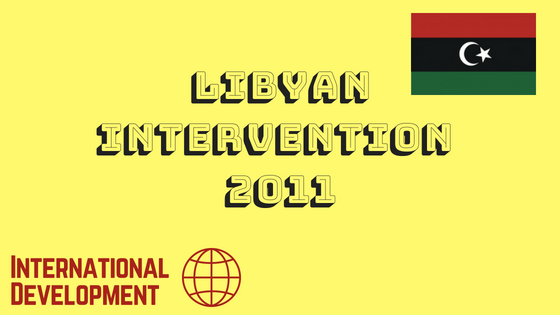NATO Intervention in Libya 2011: INTRODUCTION
.png)
The Libyan 34 year-long dictator, Muammar Gaddafi, during the uprising in 2011, responded with aggression and military fervor which allowed the North Atlantic Treaty Organization (NATO) to alter the course of Libya’s future (Pradella and Rad, 2017). On March 19th, 2011, the NATO coalition, dominated by the United States, United Kingdom and France and backed by Security Council Resolution 1973, led a military intervention entailing a no-fly zone, sanctions against the Libyan government and permitted “all possible force” to protect civilians and their human rights (Bush et al., 2011: 358).
Western intervention, in the form of NATO military intervention, contributed to the fall of the Libyan dictator and helped establish a UN-backed transitional government. However, Libya’s story is not a success story. Today Libya is a country ravaged by turmoil and infighting amongst different rebel groups fighting for power, leaving the country without a functioning government capable of protecting them (Kuperman, 2013: 105). The main argument for the intervention is the “humanitarian argument” (Chivvis, 2014: 52) which was supported by American, French and British leaders as well as the Arab League, and was heavily promoted by western media. It was based on the premise that nations had a moral and legal responsibility to protect Libyan civilians from the “dangerous” Gaddafi (Bush et al. 2011: 358). However, upon assessment, it becomes clear that the humanitarian argument was flawed in both its construction and execution.
The arguments against intervention on the other hand were much stronger and could be extensively corroborated by evidence. The supporters of the anti-western imperialism argument were against the intervention because they believed it was based on false claims and misconstrued motivations. They argued that western intervention was primarily about imperial interests and gains in the region, not civilian lives. The second argument against intervention focuses on the lack of exhaustion of diplomatic alternatives that would protect civilians and aid a peaceful democratic transition. Essentially the NATO military intervention in Libya should not have occurred because of the flawed humanitarian argument, western powers’ imperialist motivations and the non-exhaustion of diplomatic alternatives.
✅ @fleurdb, I gave you an upvote on your post! Please give me a follow and I will give you a follow in return and possible future votes!
Thank you in advance!